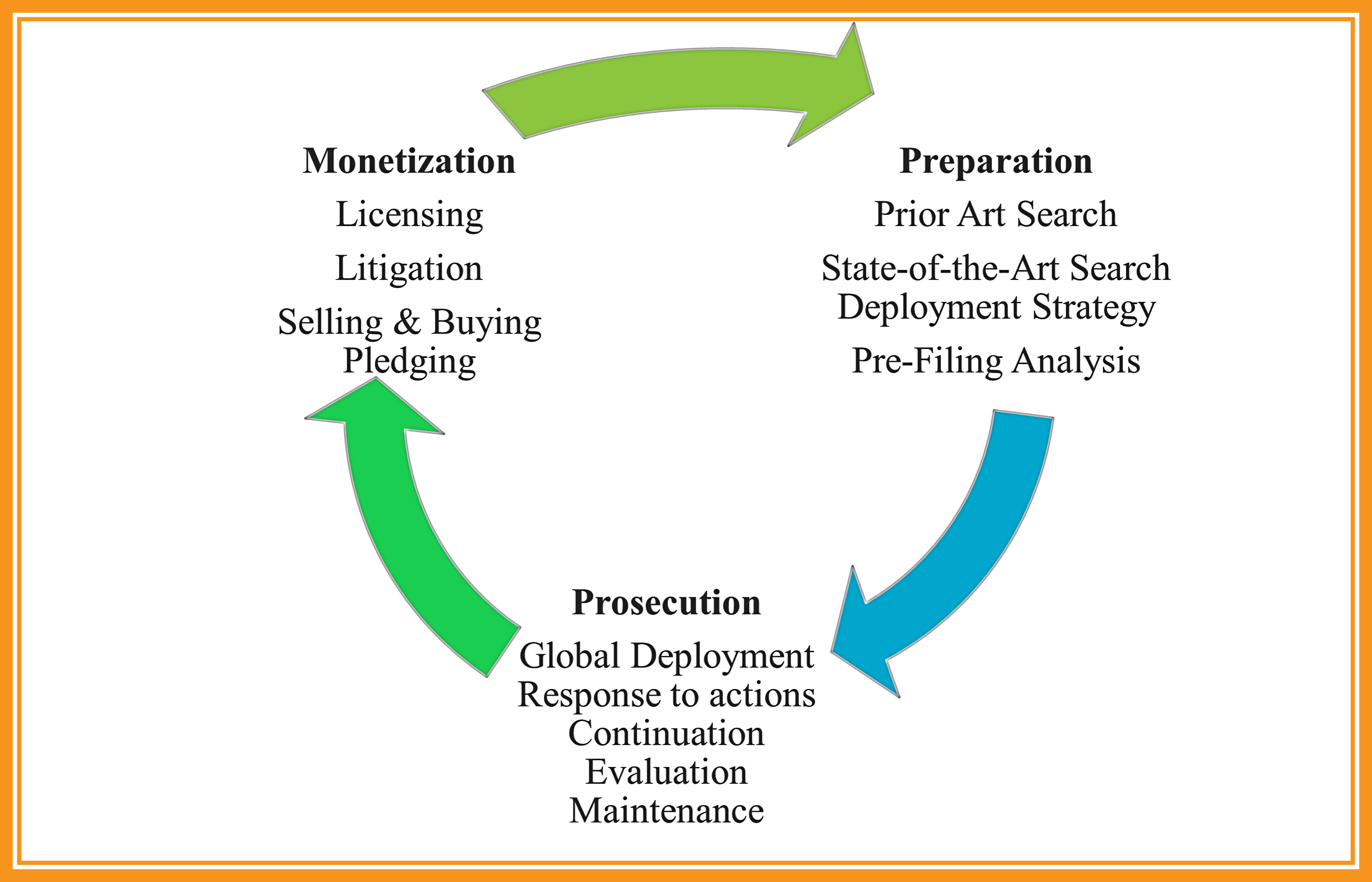Patent portfolio management
Patent portfolio management is the process by which a company’s patent strategy is coordinated with its product plan. A patent portfolio plays a large element in a company’s overall value. To determine the genuine worth of a company’s patents, the value of its patent portfolio should be measured as a whole. Effective analysis and management of an organization’s IP/ Patent Portfolio can therefore unlock business opportunities as well as reduce cost burden, and therefore attempts to strike a balance between risks and rewards.
Patent lifecycle management
The totality of the operations carried out across the lifespan of a patent, from preparation to filing, patent prosecution, office actions, issuance, maintenance, and post-grant monetization, are collectively called “patent lifecycle management.”

Right-Size Your Patent Portfolio:
The management and monitoring of patent portfolios must be a continuous process. Companies should review their portfolios on a regular basis to make sure they are in line with their overall vision, mission and objectives. This due diligence will assist in deciding whether to renew, licence, sell, or completely give up on patents.
5 Different stages of a Patent Life Cycle
- Explore
- Generate
- Protect
- Optimize
- Decline
1. Explore
This is the stage at which a new technology is brought to the market and the demand for it is created. If new potentials that are ripe for development are identified, patent applications with broad claims can be filed for the appropriate concepts and architectures. At this point, the profits generated by a technology may be less and slow. This is also known as the “extreme cutting edge. ” phase.
2. Generate
As soon as topic areas and areas of competence with rising strategic importance are discovered, selective patent searches (patent monitoring) should be conducted. The goal is to use patent searches to strategically monitor future advancements in specific domains of technology and corresponding rivals. It should be noted that most patent documents are only disclosed 18 months after the priority application. It is recommended that specialists be hired within the enterprise to conduct these searches and, where applicable, analyse prototypes that are already available for specific competitors and areas of competence.
3. Protect
This is the stage at which a technology is accepted by the general public. At the same time, several competing and alternative technologies are being created. This is the point at which profits peak and then begin to fall. The novelty of a technology gradually fades.
4.Optimize
In cases where budgets have been unexpectedly cut, pausing prosecution activities can optimize the portfolio cost. Even while it may merely postpone costs, doing so can help you save money in the short run.
5. Decline
Sales and profitability drop at this point. A technology reaches the point where further development is unprofitable when superior alternatives are introduced, rendering it outdated. The possibilities for exclusive out-licensing should be considered here, where this is possible on the basis of other, already existing licensing agreements. Otherwise it must be assumed that there is little benefit compared with the high costs. If there are no other reasons against this, for example the need for a large patent portfolio, such patents can be abandoned, sold or disposed of or donated.
Conclusion
A patent life cycle analysis provides its own set of benefits. Patent portfolio management can help not only identify the next stages, but also channel R&D efforts and ease monetization decisions. MCRPL’s IP experts have the expertise to serve you with an entire suite of IP tools and services that may help you cut costs, streamline procedures, and optimise your patent portfolio. Check out our IP management Services if you need help managing your entire portfolio.
© Molecular Connections Private Limited
For more information, contact priorart@molecularconnections.com
For more updates subscribe IP Tech Insider






